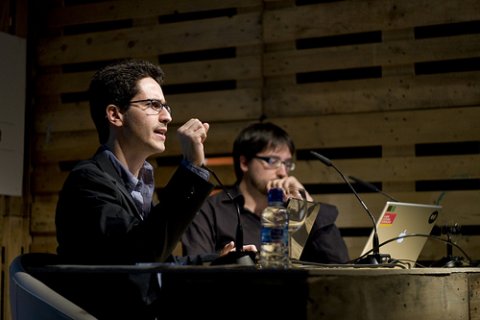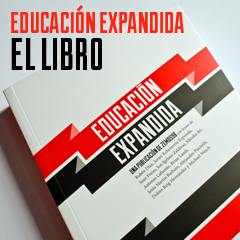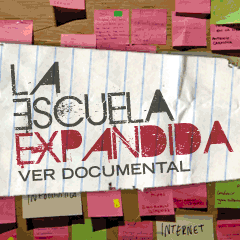RONALDO LEMOS: EXPANDING THE LEGAL AND SOCIAL COMMONS TO FACE THE COPYRIGHT
POR Tiscar Lara 29/03/09 // Español

Ronaldo Lemos has a foot in the Academy as a professor of law in Brazil and the other in Activism, as the director of Creative Commons in the same country. It gives him a double profile of particular interest because he combines the reflection on intellectual property, from the in-depth study of matter, with the action to modify and adapt it to new forms of social construction.
In his Future challenges for education: Community, free culture and intellectual property conference, Lemos has gone through the contradictions of copyright in a society that needs a more flexible, in this context we would say expanded, to provide education within a free culture.
Taking his country as an example, Ronaldo has shown data about how popular culture is increasingly underrepresented in the cultural industries, whether in music, newspapers or book sales, while at the same time popular culture is developing within a collaborative culture that emerges with great force. Proof of this is the numer of entries in Wikipedia in Portuguese (that outnumber the Spanish) but also the tendency to create by themselves situated versions of collaborative models like the videospace Videolog born even before YouTube, the SciELO portal for scholarly publication or the citizen journalism media Overmundo, also cofounded by Lemos.
It is not true, therefore, that there is no interest or market for culture, on the contrary it reveals the problems generated by the basics of copyright: a) is automatically applied, b) controls almost all the content and c) it is very difficult to get permission to act.
To demonstrate this argument, Ronaldo gave us some examples of contradictions, paradoxes and tragedies we face as owners and users of copyright:
How to make a film for a handful of dollars and end mortgaged by copyright.
The case of Darknet against Hollywood.
When you take pictures and can not recall your right to use them (the case of the Ikpeng community and the anthropologist Jesco Puttkamer)
Vale Tudo, a Brazilian soap-opera, whose archives are not available from the production company but from the margins always being expanded in YouTube.
Campaign of Brazil ABDR condemning the use of photocopying in universities, considering in the other hand that the price of recomended college textbooks is around 200 and 500 dolars and there are only 5 books per 100 students available in the university libraries.
So far Ronaldo Lemos have shown how copyright is a barrier to reuse and cultural reconstruction, but it also involves a problem of access to culture by the traditional distribution models. The data is serious enough: while in Brazil there are only 200 libraries for 200 million habitants, we find 90,000 lan-houses (a kind of community cibercafes) spread around the country (see video).
What is the solution to this contradictory situation? In addition to expanding the practice, Ronaldo also proposes expanding the laws and find ways among the public domain, fair use, licensing CC, GNU, etc. to write laws to address a reform of copyright according to the new times: a kind of legal commons. At this moment, there is a process of policy reform about copyright in Brazil to be know soon.
But there is also a social commons, which Lemos defined as "any situation in which intellectual property is not known, it is not claimed or it is irrelevant and there is a tacit agreement to use". These "social commons" practices arise from the peripheral and appropriate technology to produce knowledge and culture. There are examples of social commons in the genre of amateur manga Döjinshi but also in the music that comes from Brazil Tecnobrega. To read more about this topic, we recommend reading the chapter to Ronaldo Lemos on Access Knowdledge in Brazil, New research on intellectual property, innovation and development (2008, pdf).
Ronaldo Lemos Conference audio in English
Palabras clave //
Comentarios //
Todavía no hay ningún comentario.Comentar
Autores
- Beatriz Rodríguez | ZEMOS98 //
- Colectivo Núbol //
- comcinco //
- faaq //
- Felipe G. Gil | ZEMOS98 //
- José Antonio Jiménez Ramos //
- Juan Freire //
- Juan Rafael Fernández //
- Juanjo Muñoz //
- LaFundició //
- Leo Ruffini //
- Marina Garcés //
- Marta G. Franco //
- Paloma Sanz //
- Pedro G. Romero | Archivo F.X. //
- Pedro Jiménez | ZEMOS98 //
- Rubén Díaz | ZEMOS98 //
- Sofía Coca | ZEMOS98 //
- Tiscar Lara //
- ZEMOS98 //
Comentarios recientes
- Yo por decir que el ingles es mas importante,que el valenciano me la tienen jurada. Estoy (...) //
- Asombrosa visión de una realidad innegable, el abrazo cordial entre la educación y la tecnología (...) //
- La educación es constante. cada dia se aprende algo más. www.ajedrezutea.com //
- las imagenes son una per dida de tienpo por lo que no presentan la realidad yo soy de aranzazu (...) //
Archivo
2012
2011
2010
2009
Blogs de referencia
- Planeta Educativo //
- Edu-Factory //
- UOC UNESCO Chair in e-learning //
- José Antonio Jiménez - Educa09 //
- Pensamiento Pedagógico Radical //
- Juanjo Muñoz - Efervescente2H //
- Dolores Álvarez Peralías - Diario //
- Banco Común de Conocimientos //
- Juan Freire //
- IGUALES EN LAS TRES MIL //
- Tumblr Educación Expandida //
- Espacio-Red de Prácticas y Culturas Digitales UNIA //
- Tíscar Lara //
- TRANSDUCTORES //
- Brian Lamb - abject learning //
Palabras clave
- Archivo98 //
- arte //
- audiovisual integrado //
- BCC //
- competencia digital //
- control-total //
- creatividad //
- cuento //
- e-learning //
- edublogs //
- educación mediática //
- EDUEX //
- escucha activa //
- fábrica expandida //
- Ferrer i Guàrdia //
- fotografías //
- juego //
- Paulo Freire //
- pedagogía crítica //
- Sistema Educativo //
- videos //



